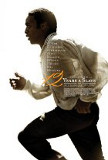12 Years a Slave (United States, 2013)
October 23, 2013
12 Years a Slave, sure to be a heavy hitter when the 2014 Oscar nominations are announced, is a powerful and compelling adaptation of Solomon Northup's autobiographical account of the dozen years he spent as a slave on Louisiana plantations from 1841 until 1853. When it comes to depicting the conditions in which slaves lived and worked, 12 Years a Slave doesn't soft-sell anything. Scenes of brutality are routinely depicted in unflinching shots that skate close to an NC-17 edge.
The screenplay, credited to John Ridley, offers a condensed and slightly reworked history of Northup (Chiwetel Ejiofor), a New York free man who was kidnapped and sold into slavery. He toiled on plantations for 12 years, serving under various owners, until he found an ally in a white Canadian carpenter who was willing to take word of his plight north. After being freed, Northup's story was published and sold some 30,000 copies. After being forgotten for about a century, it was rediscovered during the 1960s. Steve McQueen's (Shame) movie isn't the first adaptation - the 1984 TV film Solomon Northup's Odyssey told the story, albeit with the violence and brutality considerably toned down from what is depicted in 12 Years a Slave.
The film offers a formidable indictment of the cruelty of which human beings are capable. Not every white man in the film is vile - Benedict Cumberbatch's Ford and Brad Pitt's Bass are counter-examples - but even the best men are hamstrung by the social and cultural mores of the time. Two people embody the most unpleasant aspects of white men in the South - Tibeats (Paul Dano), a worker on Ford's land, and Edwin Epps (Michael Fassbender), a cotton plantation owner. Both perceive blacks as less than human, thereby making their treatment of them justifiable. Epps also uses Biblical verses to validate his occasionally horrific actions. It has been said that the Bible can be used to justify almost any atrocity and this is an example. Epps' view was widely shared throughout the South before, during, and even after the Civil War.
12 Years a Slave is dominated by Chiwetel Ejiofor, whose performance is sure to earn an Oscar nomination. Like Daniel Day Lewis' Lincoln in 2013, this is the one acting turn that rises to the top, emerging as heads-and-shoulders above other worthy contenders. Ejiofor's facial expressions, captured in lingering close-ups by McQueen, display a variety of emotions with such utter conviction that they cut to the quick. Ejiofor is equally good in scenes that depict Northup's comfortable home life before the abduction, his confusion during his early days of captivity, and his stolid determination while suffering under the yoke of oppression. His "Oscar moment" occurs at the very end, in a scene that will bring tears to the eyes of even the most hard-hearted audience member.
As the movie's villain, Michael Fassbender provides an Epps who is not only rotten to the core but unhinged (either by drink, religious fervor, or some kind of mental illness). The character is more frightening than Paul Dano's Tibeats because of his unpredictability and his position of power. The scene in which he commands Northup to whip Patsey (Lupita Nyong'o) is as close to unwatchable as anything represented on film this year. The performances of the principals elevate 12 Years a Slave's already absorbing narrative to a higher level.
If there's one complaint to be made about the acting, it relates to some of the smaller roles. Using Paul Giamatti, Alfre Woodard, and Brad Pitt in secondary parts (bordering on extended cameos), it creates "spot the star" moments that are more of a distraction than an asset. While there's nothing wrong with Pitt's portrayal, his larger-than-life presence overwhelms an underdeveloped character. It's not a fatal mistake but it's a questionable choice. The movie is powerful enough to overcome such minor missteps but it shouldn't have to.
Hans Zimmer is often criticized for bombastic scores but his work here hits all the right notes. It's ominous and understated and enhances the tension and grimness of many situations. McQueen also took pains to recreate Civil War-era plantations by using detail from the source material as well as other historical documents to inform period aspects of the film.
12 Years a Slave is unsettling and upsetting as only a story of this sort can be. There are elements of courage and redemption but the lingering impression reminds us of how ugly the dark side of human nature can be. Like movies about Nazi Germany, this film illustrates the horrors that can take root beneath the foundations of economic prosperity and civilization. 12 Years a Slave is by no means light entertainment but it provides a more worthwhile cinematic experience than about 90% of what's out there and the impressions it leaves aren't easily dismissed or dispelled.
12 Years a Slave (United States, 2013)
Cast: Chiwetel Ejiofor, Michael Fassbander, Lupita Nyong'o, Benedict Cumberbatch, Paul Dano, Sarah Paulson, Adepero Oduye, Brad Pitt
Screenplay: John Ridley based on the book by Solomon Northup
Cinematography: Sean Bobbitt
Music: Hans Zimmer
U.S. Distributor: Fox Searchlight
U.S. Release Date: 2013-10-18
MPAA Rating: "R" (Violence, Disturbing Images, Nudity, Sexual Content)
Genre: DRAMA
Subtitles: none
Theatrical Aspect Ratio: 2.35:1
- (There are no more better movies of Michael Fassbander)
- (There are no more worst movies of Michael Fassbander)
- (There are no more better movies of Lupita Nyong'o)
- Non-Stop (2014)
- (There are no more worst movies of Lupita Nyong'o)

Comments